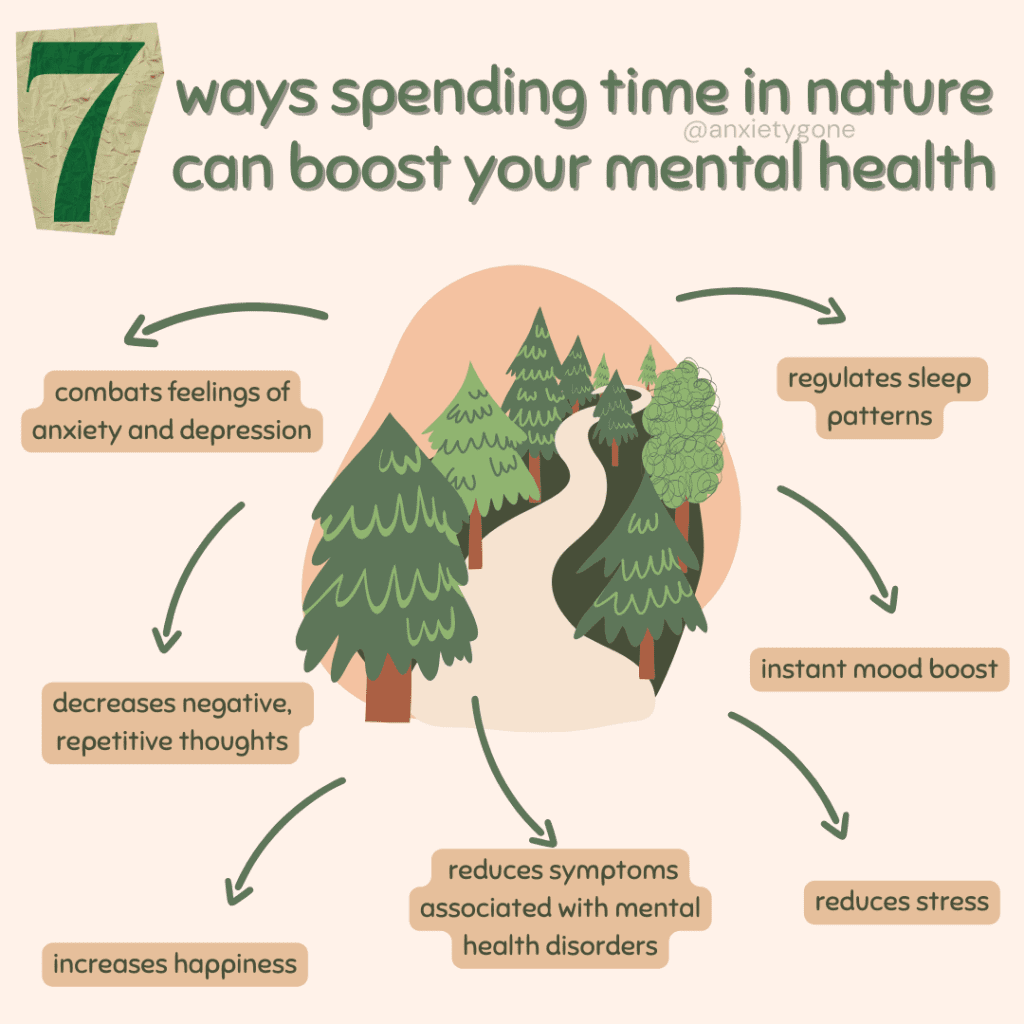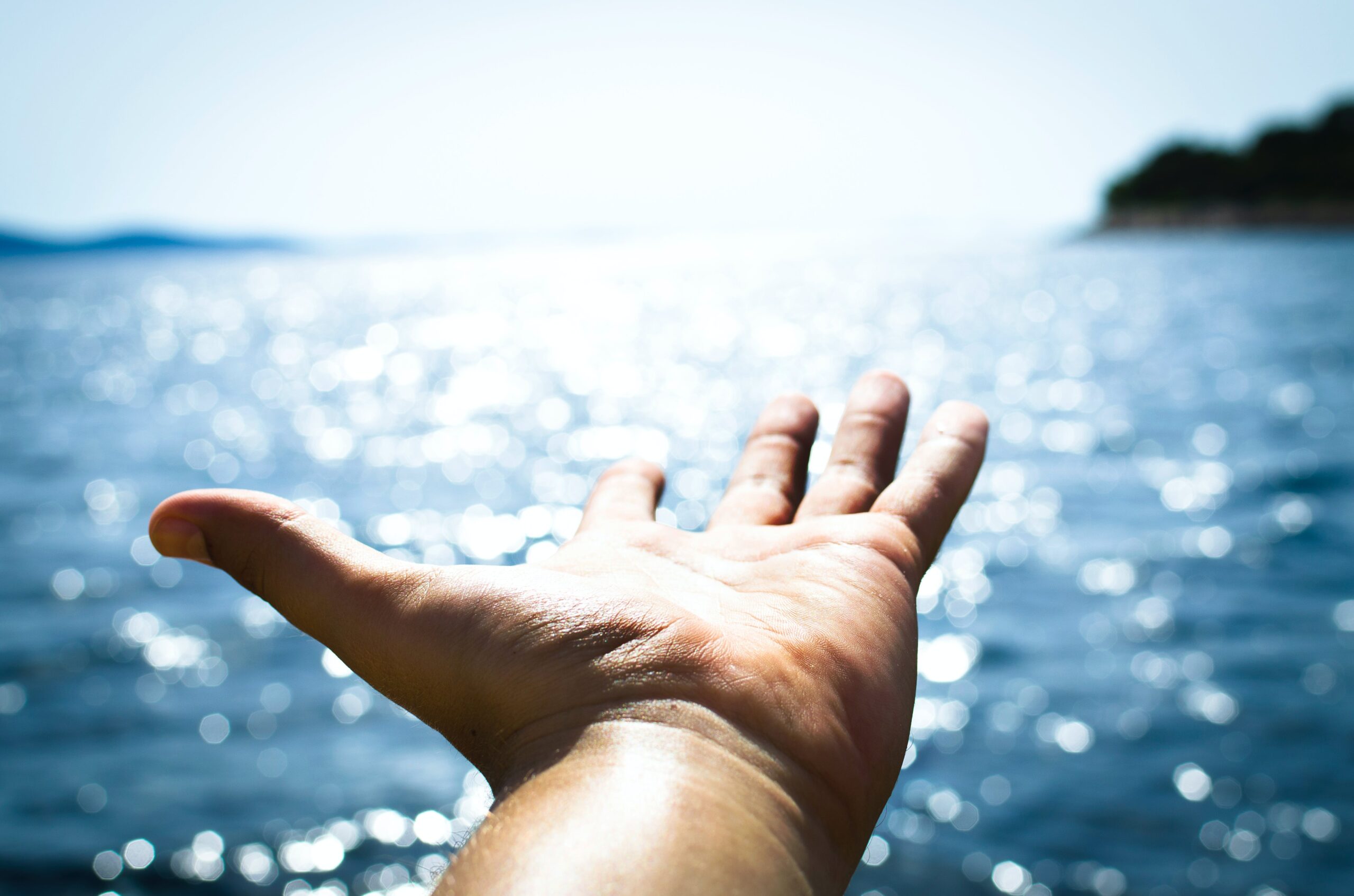Full Disclosure: Clicking on these links could mean a tiny commission for me, at no extra cost to you.
Breathe in the green, exhale the blues. From the whisper of leaves to the symphony of waves, nature is our sanctuary that holds all kinds of benefits for our mental health. And all you have to do to reap these benefits is spend more time outdoors. So, let’s dive into the various ways spending time in natural can help with mental health, and simple practical ways to do more of it.
How Nature Can Help with Mental Health
Nature offers a serene escape from stress of daily life, providing a unique and powerful remedy for mental health challenges. Immersing yourself in the tranquility of natural spaces, from lush forests to soothing shores, can significantly help with mental health. The sensory experience of nature, including its sights, sounds, and smells, can stimulate the production of positive brain chemicals, reducing stress, anxiety, and depression. But that’s not all. Let’s check out the many benefits of spending time in nature.
1. Nature Reduces Stress
Nature is a natural stress reliever. The sight of greenery, the sounds of a flowing river, and the fresh scent of earth after rain can instantly evoke a sense of peace. This calming effect of nature isn’t just subjective either. It’s supported by numerous studies that show reduced cortisol levels (your stress hormone) after spending time in natural environments.
2. Reduces Depression and Anxiety
Depression and anxiety, two of the most common mental health issues worldwide, can also be alleviated by spending time in nature. Research has found that people who frequently visit natural settings report lower levels of depression and anxiety compared to those who do not.
3. Decreases Rumination
Several studies highlight the positive effects of how nature can help with mental health. For instance, research from Stanford University found that participants who walked in natural settings reported decreased rumination. Putting an end to that relentless cycle of overthinking and dwelling on negative thoughts can be a game-changer for mental health.
When we ruminate, we’re essentially stuck in a mental loop, replaying worries, doubts, and fears without finding a way out. This not only drains our emotional energy but also clouds our ability to see situations clearly and to find solutions. Breaking free from this cycle allows for a significant shift in perspective.
With decreased rumination, our minds become clearer, making room for more positive and constructive thoughts. This clarity enables us to tackle challenges with a fresh mindset, reduces stress, and promotes a more balanced emotional state.
4. Influences Brain Chemistry
The benefits of nature extend to the biochemical level, influencing brain chemistry positively. When we immerse ourselves in natural surroundings, our brain responds in ways that significantly benefit our mental health. Natural settings have been found to increase the production of your feel good hormones, such as dopamine and serotonin. These neurotransmitters are associated with feelings of happiness and well-being.
Essentially, nature acts as a natural antidepressant, without the side effects of medication.
5. Improves Mood
Spending time in nature doesn’t just change the scenery around you; it has a profound effect on your mood. Nature has this incredible ability to lift our spirits, chase away the clouds of gloom, and bring a smile to our faces. This benefit isn’t just “all in your head” either; it’s backed by science. Natural environments stimulate the release of endorphins, the body’s feel-good chemicals, promoting an overall sense of happiness and contentment. The colors, sounds, and smells of nature engage our senses in a way that’s both grounding and uplifting. Moreover, the simple act of walking in a park or along a beach can shift our focus from internal stressors to the vastness and beauty of the external world. This provides you with a refreshing perspective and a break from the whirlwind of negative thoughts or daily stresses.
6. Enhances Cognitive Function
Time spent in natural settings can improve cognitive functions, such as attention, memory, and creativity. Natural environments also help with mental health by resetting our attention span and increasing productivity.And when you enhance cognitive function, you open up a new channel of clarity in our mental processes.
When cognitive function improves, it’s like the gears of our mind are oiled and operating smoothly. This allows for thoughts to flow more freely, decisions to be made with more ease, and creative solutions to surface unexpectedly. This heightened state of mental clarity reduces frustration, lowers stress levels, and diminishes feelings of being overwhelmed, which are common triggers for anxiety and depression.
7. Improves Sleep Quality
Improving sleep quality is like hitting the reset button on our mental health – a much-needed break, especially if you’re struggling with sleep anxiety. The link between quality sleep and mental health is profound; it’s a reciprocal relationship where enhancing one positively influences the other. Nature plays a pivotal role in this dynamic by aligning our internal clocks to the natural rhythms of the day, promoting healthier sleep patterns.
Exposure to natural light, especially in the morning, signals our brains to wake up and prepares our bodies for the day ahead, setting the stage for a good night’s sleep. Conversely, as the sun sets, the diminishing light cues our bodies to produce melatonin, the sleep hormone, helping us wind down and drift off more easily. This natural ebb and flow are essential for regulating our sleep cycles, which, when disrupted, can lead to mental health issues such as increased stress, anxiety, and depression.
Plus, spending time in nature can reduce stress and anxiety levels, helping to combat two common culprits of sleep disturbances.
8. Reduces Symptoms of Mental Health Disorders
Outdoor activities and exposure to green spaces can reduce symptoms associated with mental health disorders like PTSD, ADHD, and others. The calming effect of natural settings can significantly lower stress hormones, decrease feelings of fear and anger, and uplift spirits. This, of course, comes with a plethora of ways this can help with mental health as a whole.
9. Enhances Creativity
Nature can stimulate the senses in unique ways, sparking creativity and inspiration. It’s in the unexpected flutter of a butterfly’s wings, the intricate patterns of leaves, or the vastness of a starlit sky that our minds find new patterns, connections, and possibilities. This stimulation of sensory experiences and the awe that nature can invoke broaden our cognitive boundaries, allowing for a flow of creativity. This helps you get some pep back in your step, on your canvas or wherever you like to express yourself artistically.
Nature’s ability to enhance creativity directly helps with mental health by providing a sense of accomplishment and self-expression. Creating something new, whether it’s a piece of writing inspired by a walk in the woods or a drawing of a scene from nature, offers a tangible output for our internal processes.
10. Boosts Immune System
A stronger immune system plays a pivotal role in supporting and enhancing our mental health, as there’s an intricate link between our physical well-being and psychological state. At first glance, the connection between immunity and mental health might seem indirect, but it’s profoundly significant. When our immune system is strong, we’re not just better equipped to fend off illnesses. We also experience a positive impact on our mental health, which in turn can strengthen our immune response — a beneficial cycle of health and well-being.
The mechanism behind this connection lies in the body’s response to stress. Chronic stress can weaken the immune system, making us more susceptible to infections and diseases. This physical vulnerability can increase anxiety and stress, creating a feedback loop that further taxes both our mental and physical health. A strong immune system, therefore, acts as a buffer against this cycle. When our bodies are less burdened by illness, our minds are relieved from the stress and worry that come with health issues, allowing us to maintain a more positive outlook and better stress management capabilities.
11. Enhances Energy
People often report feeling more alive and energized after spending time in natural settings. When our energy reserves are full, we approach the world with a sense of readiness and enthusiasm that can dramatically transform our mental and emotional outlook. This influences mental health in several ways, offering a brighter outlook and a more resilient approach to challenges.
Also, with increased energy, we’re more likely to engage in physical activity, a known mood booster. Exercise stimulates the production of endorphins, often referred to as the body’s natural antidepressants, which can reduce feelings of sadness and anxiety. Moreover, having the energy to participate in activities we enjoy or to try new hobbies can increase our sense of accomplishment and satisfaction, reinforcing a positive self-image and enhancing our sense of well-being.
12. Reduces Aggression and Negative Emotions
Studies have shown that natural environments can reduce aggression and foster a more positive outlook on life. This is key for supporting mental health. When we find ways to lower levels of aggression and negativity, we make way for more positive interactions with the world around us, creating an environment where our mental well-being can flourish.
The link between aggression, negative emotions, and mental health is a complex web as well; where one feeds into the other, often creating a cycle that’s hard to break. Aggression and negative emotions can lead to stress, strained relationships, and a pervasive sense of unhappiness, which, in turn, can exacerbate mental health issues such as anxiety and depression. By addressing these feelings and finding healthy outlets for them, we can significantly improve our mental health.
13. Increases Resilience to Stress
Regular contact with nature can help build a more resilient response to the stresses of everyday life, and increasing resilience to stress is imperative for improving mental health. This increased resilience serves as a buffer against the development of stress-related disorders, like anxiety, while also enhancing your overall emotional well-being.
Also, with increased resilience, we’re more likely to approach problems with a problem-solving attitude, viewing them as surmountable challenges rather than insurmountable obstacles. This shift in perspective can significantly reduce the anxiety and depression that often accompany chronic stress, offering a sense of control and empowerment in situations that might otherwise trigger a negative spiral.
14. Higher Self-Esteem and Confidence
Engaging in outdoor activities can boost self-esteem and confidence through achievements and exploration. High self-esteem and confidence not only enhance our ability to face life’s challenges but also improve our relationships, productivity, and overall satisfaction with life. This positive sense of self is crucial for mental health, as it buffers against the impact of stress, reduces the likelihood of experiencing anxiety and depression, and promotes resilience in the face of adversity.
15. Encourages Mindfulness and Presence
The natural world encourages a state of mindfulness and being present in the moment. This heightened state of awareness can help with mental health, serving as an anchor that keeps us from being swept away by the undercurrents of past regrets or future anxieties. By supporting mindfulness and presence, we create a mental environment where calmness and clarity lead, significantly reducing stress, anxiety, and depression.
Practical Ways to Incorporate Nature into Your Life
Incorporating nature into daily life can significantly enhance your well-being, both mentally and physically. Here are some practical ways to weave the healing power of nature into your routine, regardless of where you live or how busy you might be:
- Morning Walks or Runs
- Traditional Gardening
- Window or Container Gardening
- Nature Breaks Throughout The Day
- Outdoor Workouts
- Eating Outdoors/Picnics
- Nature Sounds
- Visit Botanical Gardens and Nature Reserves
- Find a New Outdoors Hobby, like Nature Photography
- Volunteer for Environmental Causes: (Beach cleanups, tree planting, etc.)
- Take Your Pet for More Forest Walks
- Plan Nature Vacations, such as camping
- Make Nature Crafts
- Bird Watching
- Stargazing
Incorporating these activities into your life can help bridge the gap between your daily routine and the natural world, enriching your life with the numerous benefits that nature has to offer.
FAQs
What are the immediate effects of spending time in nature?
Spending time in nature can lead to immediate benefits such as a reduction in stress, enhanced mood, and increased feelings of energy and vitality. Many people experience a sense of calm and restoration almost as soon as they step into a natural setting. This is partly due to the reduction in noise and urban stimuli, which allows the mind to relax. Physiological effects, such as lower blood pressure and decreased heart rate, can also occur, contributing to an overall sense of well-being.
Can nature exposure help with major mental health disorders?
Yes, nature exposure can be beneficial for individuals with major mental health disorders, including depression, anxiety, and post-traumatic stress disorder (PTSD). While nature is not a standalone treatment, it can complement traditional therapies effectively. The calming effect of natural environments can help reduce symptoms of stress and anxiety. Additionally, engaging in physical activity in natural settings can enhance mood and self-esteem, providing a positive impact on various mental health conditions.
How much time in nature is necessary for mental health benefits?
Research suggests that as little as 20 to 30 minutes spent in nature can lead to significant reductions in cortisol levels, a stress hormone, thereby offering mental health benefits. However, longer durations and frequent visits can enhance these benefits. The key is regular exposure; even short daily or weekly visits to green spaces can contribute to a noticeable improvement in mental well-being over time.
Are there benefits to indoor plants and virtual nature experiences?
Yes, indoor plants and virtual nature experiences can also have positive effects on mental health. Indoor plants can improve air quality, enhance mood, and reduce stress and anxiety, making them a valuable addition to indoor environments. Similarly, virtual nature experiences, such as viewing nature scenes on a screen or listening to natural sounds, can provide temporary relief from stress and increase feelings of relaxation, although they are less effective than real-life nature exposure.
How can people living in urban areas maximize their nature exposure?
People living in urban areas can maximize their nature exposure by taking advantage of local parks, community gardens, and green rooftops. Regular walks or jogs in these green spaces can be easily incorporated into daily routines. Urban dwellers can also create green spaces in their homes with indoor plants or balcony gardens. Participating in local outdoor activities or groups, such as hiking clubs or outdoor fitness classes, can provide both social connections and increased time in nature. Exploring nearby nature reserves or forests during weekends or holidays can also offer deeper nature experiences.
Conclusion
A “green prescription” may be just what the doctor ordered for those seeking to improve their mental health. The evidence is clear: nature has a profound impact on our psychological well-being. By finding ways to integrate nature into our daily lives, we can foster a healthier, happier mind. As we continue to navigate the challenges of the modern world, let us not forget the timeless remedy that surrounds us—the healing power of nature.













































